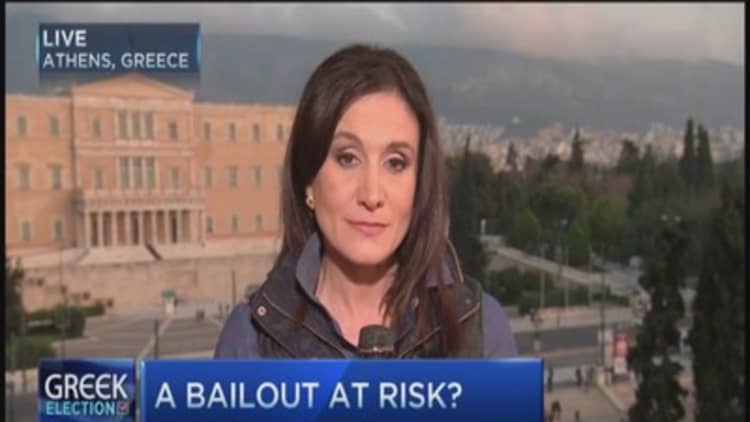The risk of a sovereign default in Greece has increased after the anti-austerity Syriza party won Sunday's snap elections, analysts say, noting that anxiety over the possibility that Greece will exit the euro zone will keep global markets nervous.
"A period of uncertainty and heightened market nervousness now seems likely," said Capital Economics Chief European Economist Jonathan Loynes in a note. Syriza's victory "ultimately raises the risks of a Greek exit from the euro-zone," he said, noting "the risks of a re-ignition of the euro-zone crisis have risen significantly."
Greece's left wing Syriza looked set to win at least 149 seats in the 300 seat parliament. Based on a partial count, the party took 36.5 percent of Sunday's vote, nearly nine points ahead of the ruling conservative New Democracy party, according to interior ministry projections.
Markets had priced in a Syriza victory, but not by this margin – "the elections results increase the risk that Greece will default and trigger some risk-off selling across the markets today," said Mizuho senior credit analyst Ryosuke Kaneko, who covers European credit markets.
Stocks in Asia slumped in early trade Monday but managed to regain some ground. Meanwhile, U.S. futures pointed to a shaky start on Wall Street, with Dow futures falling more than a 100 points and the S&P 500 down over 10 points.
Unknown risks
"Nobody knows how things are going to turn out," said ING's Chief Asia Economist Tim Cordon.

The results will certainly put an end to assumptions that Syriza would need to form a coalition with a partner that would have a moderating effect on their anti-austerity position, according to Mizuho's Kaneko.
And while analysts tend to agree that Syriza's victory increases the risk that Greece may leave the euro zone, they disagreed over what the potential fallouts may be.
Read MoreECB now faces another battle: Dealing with Greece
The election results could lead to substantial contagion effects on other countries and perhaps encourage the rise of other anti-austerity and even anti-euro parties across the currency union, warned Capital Economics' Loynes.
But, the threat of contagion to peripheral countries is far smaller than in 2012, argued AMP Capital's Head of Investment Strategy and Chief Economist Shane Oliver in a note.
"Portugal, Ireland and Spain are now in much better shape and the defense mechanisms in Europe are far stronger with a strong bailout fund, a banking union and an aggressive European Central Bank," he said.
What next for Syriza?
Another big unknown is how Syriza will behave once it's in power.

Greece owes more than $350 billion to government institutions and investors. The country also faces a 3.5 billion euro bond coming due this July and another 3 billion in August. Syriza members told CNBC on Sunday that the party's top priority is to win a dramatic easing of its repayment terms.
Meanwhile, there is a fundamental contradiction in Syriza's position of being against the austerity program imposed by the European Union and wanting to say in the euro zone, said Mizuho's Kaneko.
Both the new Greek government and the ECB want to keep the country in the euro zone, said ING's Cordon, noting the possibility of Greece exiting the euro zone is "a low probability event." Still, he expects markets to ebb and flow in line with the headlines on that front.

